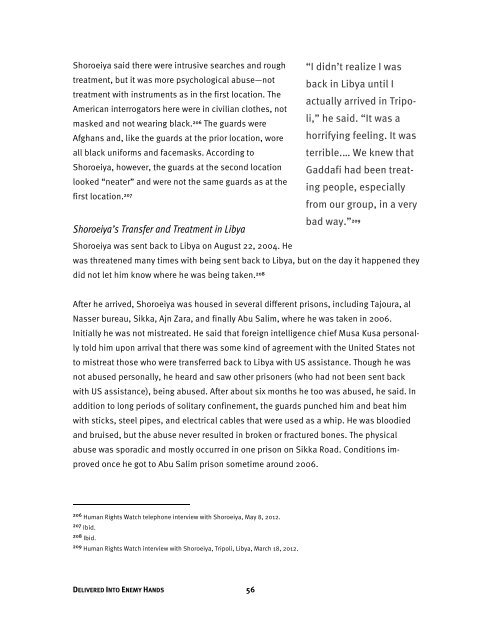Delivered Into Enemy Hands - Human Rights Watch
Delivered Into Enemy Hands - Human Rights Watch
Delivered Into Enemy Hands - Human Rights Watch
Create successful ePaper yourself
Turn your PDF publications into a flip-book with our unique Google optimized e-Paper software.
Shoroeiya said there were intrusive searches and rough<br />
treatment, but it was more psychological abuse—not<br />
treatment with instruments as in the first location. The<br />
American interrogators here were in civilian clothes, not<br />
masked and not wearing black. 206 The guards were<br />
Afghans and, like the guards at the prior location, wore<br />
all black uniforms and facemasks. According to<br />
Shoroeiya, however, the guards at the second location<br />
looked “neater” and were not the same guards as at the<br />
first location. 207<br />
Shoroeiya’s Transfer and Treatment in Libya<br />
Shoroeiya was sent back to Libya on August 22, 2004. He<br />
was threatened many times with being sent back to Libya, but on the day it happened they<br />
did not let him know where he was being taken. 208<br />
After he arrived, Shoroeiya was housed in several different prisons, including Tajoura, al<br />
Nasser bureau, Sikka, Ajn Zara, and finally Abu Salim, where he was taken in 2006.<br />
Initially he was not mistreated. He said that foreign intelligence chief Musa Kusa personally<br />
told him upon arrival that there was some kind of agreement with the United States not<br />
to mistreat those who were transferred back to Libya with US assistance. Though he was<br />
not abused personally, he heard and saw other prisoners (who had not been sent back<br />
with US assistance), being abused. After about six months he too was abused, he said. In<br />
addition to long periods of solitary confinement, the guards punched him and beat him<br />
with sticks, steel pipes, and electrical cables that were used as a whip. He was bloodied<br />
and bruised, but the abuse never resulted in broken or fractured bones. The physical<br />
abuse was sporadic and mostly occurred in one prison on Sikka Road. Conditions improved<br />
once he got to Abu Salim prison sometime around 2006.<br />
206 <strong>Human</strong> <strong>Rights</strong> <strong>Watch</strong> telephone interview with Shoroeiya, May 8, 2012.<br />
207 Ibid.<br />
208 Ibid.<br />
209 <strong>Human</strong> <strong>Rights</strong> <strong>Watch</strong> interview with Shoroeiya, Tripoli, Libya, March 18, 2012.<br />
DELIVERED INTO ENEMY HANDS 56<br />
“I didn’t realize I was<br />
back in Libya until I<br />
actually arrived in Tripoli,”<br />
he said. “It was a<br />
horrifying feeling. It was<br />
terrible.… We knew that<br />
Gaddafi had been treating<br />
people, especially<br />
from our group, in a very<br />
bad way.” 209
















